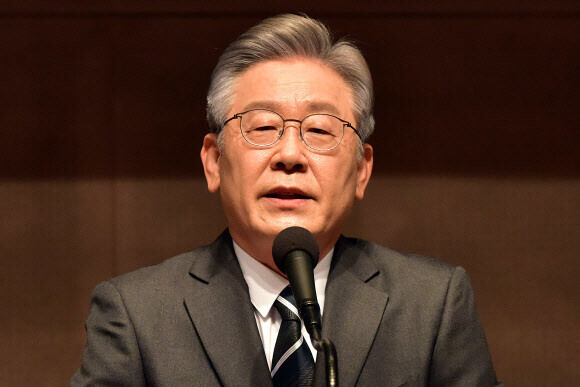hankyoreh
Links to other country sites 다른 나라 사이트 링크
Lee Jae-myung admits shortcomings of Moon administration, apologizes

Democratic Party presidential nominee Lee Jae-myung acknowledged criticisms that the administration’s “attempts to reform the social economy have not only failed to live up to the public’s hopes but also made the real estate problem worse.”
He also offered his “apology as someone who was part of the Moon Jae-in administration and Democratic Party government.”
Lee’s remarks came during a Kwanhun Club invitational roundtable Wednesday at the Korea Press Center in central Seoul’s Jung District.
“I don’t think the third Democratic Party administration has done a 100% good job,” he said.
When asked how he viewed public opinion data showing over 60% of South Koreans in favor of voting the Democratic Party out of office, Lee acknowledged the Moon administration’s missteps and apologized for them.
He also noted, “While we’ve seen corrupt practices among presidential associates and relatives under all previous administrations, I think it’s laudable that we haven’t had those kinds of issues [with the Moon administration].”
“While it is true that a Lee Jae-myung administration would be starting from the same roots, it would also be a capable and progressive administration that is very different from those that have come before it, sharing the basic things while making up for shortcomings, boldly fixing mistakes, and adding what is needed,” he added, reaffirming his plans to carry on and develop the strong points of the Moon administration.
He also stressed the need to keep the Terminal High Altitude Area Defense (THAAD) battery established in Seongju, North Gyeongsang Province, during the later stages of the Park Geun-hye administration. His remarks came in a response to a question about his current position on THAAD, which he expressed opposition to during the 2017 primary.
“While I can’t really agree in principle that [THAAD] is fully in accord with our national interests in East Asia, I can’t oppose THAAD’s deployment or simply withdraw it as I see fit under the current situation,” he said.
“I do agree that we should not be attempting any additional deployment, but I think we should accept the THAAD system that is already in place while seeking out possible alternatives beyond that,” he continued.
He also said that it would be a “very big problem to maintain an obstinate stance when it comes to the area of diplomacy, where you need to be very flexible in response to a fluid international situation.”
Lee stressed that wartime operational control should be quickly returned to South Korea from the US, while voicing his opposition to a trilateral military alliance with the US and Japan.
“I think there is a consensus among the public that it is not right for us to maintain a system that cedes operational control to the US military and pursues the US’ national and military interests,” he said.
“The operational control transfer needs to happen quickly,” he asserted.
Speaking about Japan, he said, “It would be one thing if we can manage a truly permanent relationship of interchange and coexistence based on a complete resolution of territorial and historical issues, but if we consider how vague [Japan’s] attitude on territorial issues and imperialist aggressions has been, a trilateral military alliance among South Korea, the US and Japan could be very dangerous.”
In terms of North Korea, he stressed that “economic issues are central.”
“My starting perspective is that we should create the kind of ‘peace economy system’ where peace leads to economic growth and economic growth guarantees peace,” he said.
By Seo Young-ji, staff reporter
Please direct questions or comments to [english@hani.co.kr]

Editorial・opinion
![[Column] Season 2 of special prosecutor probe may be coming to Korea soon [Column] Season 2 of special prosecutor probe may be coming to Korea soon](https://flexible.img.hani.co.kr/flexible/normal/500/300/imgdb/original/2024/0426/3317141030699447.jpg) [Column] Season 2 of special prosecutor probe may be coming to Korea soon
[Column] Season 2 of special prosecutor probe may be coming to Korea soon![[Column] Park Geun-hye déjà vu in Yoon Suk-yeol [Column] Park Geun-hye déjà vu in Yoon Suk-yeol](https://flexible.img.hani.co.kr/flexible/normal/500/300/imgdb/original/2024/0424/651713945113788.jpg) [Column] Park Geun-hye déjà vu in Yoon Suk-yeol
[Column] Park Geun-hye déjà vu in Yoon Suk-yeol- [Editorial] New weight of N. Korea’s nuclear threats makes dialogue all the more urgent
- [Guest essay] The real reason Korea’s new right wants to dub Rhee a founding father
- [Column] ‘Choson’: Is it time we start referring to N. Korea in its own terms?
- [Editorial] Japan’s rewriting of history with Korea has gone too far
- [Column] The president’s questionable capacity for dialogue
- [Column] Are chaebol firms just pizza pies for families to divvy up as they please?
- [Column] Has Korea, too, crossed the Rubicon on China?
- [Correspondent’s column] In Japan’s alliance with US, echoes of its past alliances with UK
Most viewed articles
- 1‘We must say no’: Seoul defense chief on Korean, USFK involvement in hypothetical Taiwan crisis
- 2[Column] Season 2 of special prosecutor probe may be coming to Korea soon
- 3N. Korean delegation’s trip to Iran shows how Pyongyang is leveraging ties with Moscow
- 4Amnesty notes ‘erosion’ of freedom of expression in Korea in annual human rights report
- 5Korea sees more deaths than births for 52nd consecutive month in February
- 6[Reportage] On US campuses, student risk arrest as they call for divestment from Israel
- 7[Editorial] New weight of N. Korea’s nuclear threats makes dialogue all the more urgent
- 8‘Weddingflation’ breaks the bank for Korean couples-to-be
- 9Division commander ordered troops to enter raging flood waters before Marine died, survivor says
- 10[Editorial] Korea’s surprise Q1 growth requires objective assessment, not blind fanfare